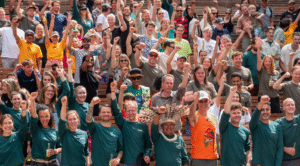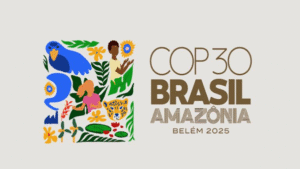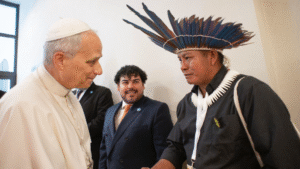In June, Chief Dadá Borarí travelled from the heart of the Brazilian Amazon to the Netherlands — not just to receive an international sustainability award, but to continue building the global alliances needed to protect his people and the forest they call home.
For over two decades, Dadá has led the resistance against illegal deforestation in the Maró territory, a 42,000-hectare region near the Tapajós River where several Indigenous communities live. The land is legally protected, but that hasn’t stopped large timber companies from trying to extract what they call green gold.
What Dadá and his people see is something else entirely: life, medicine, water, knowledge — a forest that cannot be reduced to profit.

A quiet presence with a powerful message
Chief Dadá came to the Netherlands with a clear purpose: to share his story, connect with allies, and strengthen the collaboration between his community in the Amazon and the growing Treesistance movement.
During his time in Amsterdam, he spoke about the realities on the ground in Maró and the daily work of the forest guardians who protect their territory from illegal deforestation. Together with Treesistance, he is helping expand this model of Indigenous-led forest protection across the region — through training, technology, and international solidarity.
A long path of resistance
Dadá’s resistance began in 2004, when the first illegal logging crews entered his territory. What followed were years of escalating threats, violence, and attempts to silence him.
In 2006, Dadá was kidnapped and tortured for refusing to allow the forest to be cleared. He was found unconscious, strung between two trees. A year later, his house was burned, his dogs poisoned. Today, he lives under a national security program in Brazil — escorted by armed officers every time he leaves his village.
“I don’t have freedom,” he says, “but it feels good that I am protecting the forest.”
Despite these threats, the guardians of Maró continue their work. In partnership with Dutch criminologist Tim Boekhout van Solinge, Dadá and his team now use GPS technology and smart phones to document illegal logging. If an intruder is found, the team engages in peaceful dialogue. Only if necessary, do they remove vehicle keys or call in the authorities.
Their presence alone has been effective. In recent years, loggers have stayed out of Maró.

International recognition
On June 20, Chief Dadá was awarded the Prix Voltaire — an international sustainability award given to those who fight for “future fundamentals.” He is the first Indigenous leader to receive the prize.
The ceremony took place in the coastal town of Noordwijk, at the Huis ter Duin hotel. Dadá stood alongside previous winners like Unilever’s former CEO Paul Polman and LanzaTech’s Jennifer Holmgren. But he is not easily impressed by titles or boardrooms.
“Maybe the forest is worth more than a company,” he said quietly. “What we give back is clean air and nature. The forest is not commercial, but a source of life.”
Treesistance continues
Chief Dadá’s visit to the Netherlands was part of a growing effort to build international solidarity and scale the Treesistance model. From public talks to forest walks, from intimate donor gatherings to celebrations in the park, the message remained the same: the Amazon is still under threat — and the most powerful protectors are those who have lived with and cared for the forest for generations.
Treesistance stands behind them, and we’re honoured to walk alongside Chief Dadá and the guardians of Maró.
To learn more or support the work, visit treesistance.com.
This article draws on reporting by Nick Vink, originally published in Dutch by Leidsch Dagblad on July 5, 2025. Some quotes and background details have been adapted from that original publication. Read the full article here.







